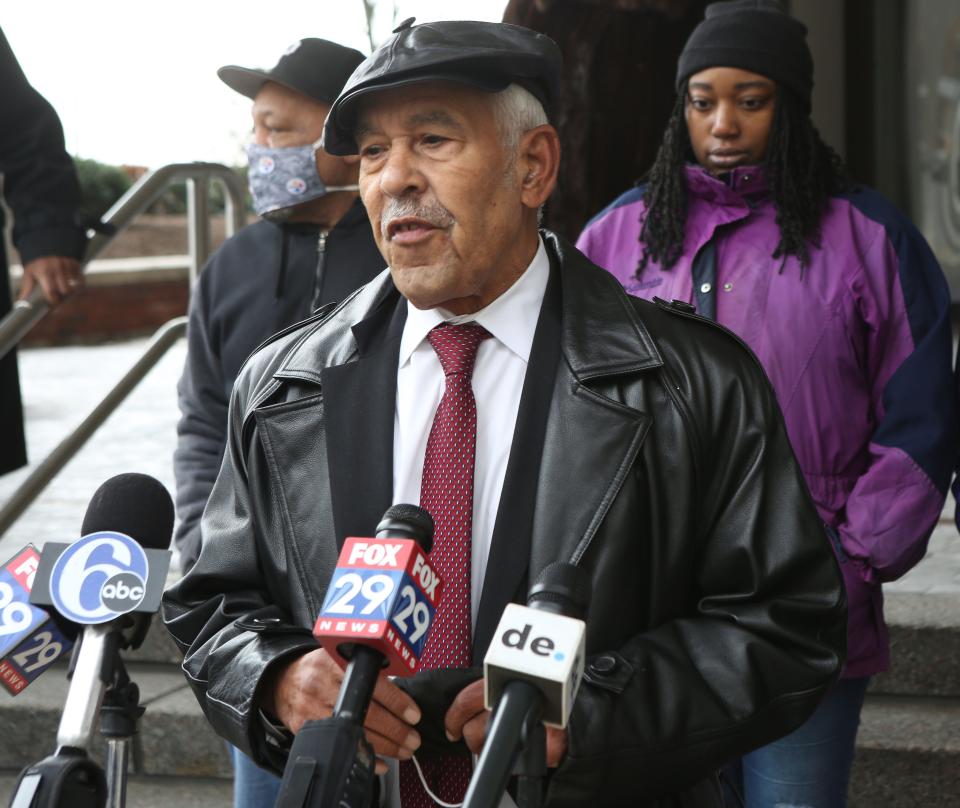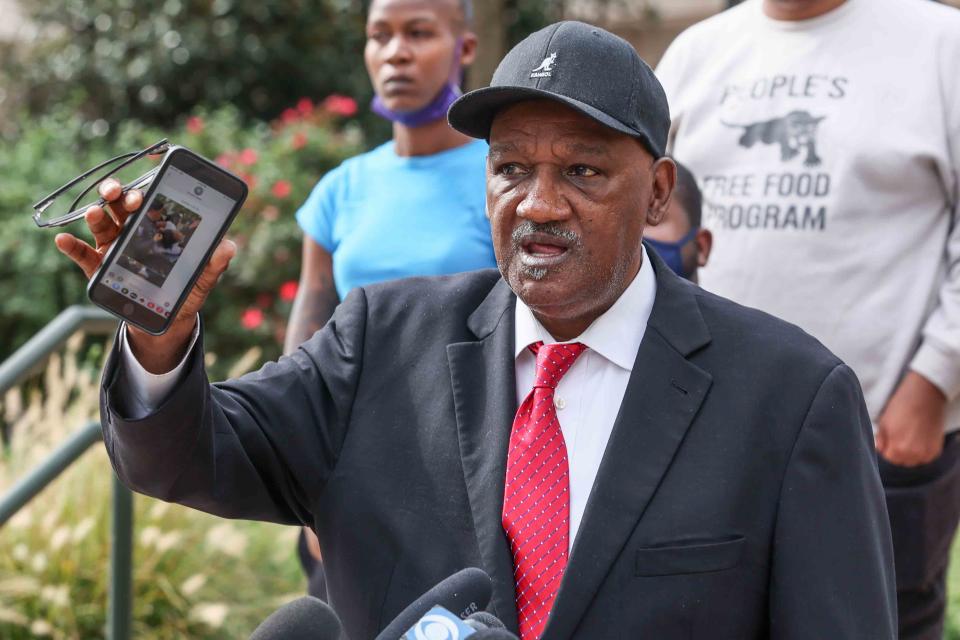Why more lawsuits over discrimination could be on the horizon for Delaware police
A Wilmington police officer testified he made more than 1,000 traffic stops over a four-year period but didn't record or report any of them unless they resulted in an arrest or traffic citation — a practice a federal lawsuit says is designed to cover up constitutional violations by officers engaging in racially biased policing.
As an example in the class-action lawsuit filed Tuesday by the ACLU of Delaware, attorneys point to what a Superior Court judge turned up when he scrutinized a police stop made by Officer James Wiggins.
The judge learned that Wiggins, a member of the Wilmington Safe Streets program, used an unrecorded radio frequency to communicate with other officers about these stops. The judge also found that the officer's understanding was that he could search an entire car as long as he smelled marijuana without having to report it to the department's communication center as he would if he were a patrol officer.
"As Detective Wiggins puts it, if he stops a car and smells marijuana, but does not issue a ticket, there would be no record of it," Superior Court Judge Calvin L. Scott wrote in a 2021 suppression order in connection with a 2019 police stop.
These are just some of the Wilmington department's practices being brought to light by the ACLU of Delaware on behalf of the state NAACP and others in a federal class-action lawsuit. The legal move represents the most significant effort to have a monitor appointed to coordinate and oversee Wilmington police develop policies that they say would end the violation of people's rights.
"I'm hoping it will help it to happen," said Jea Street of a monitor being appointed. The New Castle County councilman and 3rd vice president of the state NAACP has been advocating for federal intervention that would review Delaware police, especially after the use of force occurs. "And if it doesn't, regrettably, as I was trained you only go to court as a last resort.
"But that's the point where we are. I mean, this cannot continue."

Delaware police: 'If you're Black, watch yourself' in Delaware, NAACP says, calling for police transparency
Street said his hope is to amend the complaint to include more police departments. If not, they will file separate litigation against other police agencies.
The lawsuit against Wilmington, its police chief and its mayor seeks to address patterns and practices of unconstitutional policing by the department, including a lack of reporting and oversight of officers illegally entering homes, using excessive physical force and conducting unlawful searches without warrants.
Wilmington officials did not respond to an email seeking comment for this story, but Mayor Mike Purzycki said on Tuesday that claims made by the ACLU were offensive to him. He also vowed to "vigorously defend against this suit in court."
Federal lawsuit: Wilmington police regularly violate rights of Black people, ACLU's federal lawsuit claims
These practices are carried out primarily by officers in the Operation Safe Streets program, according to the lawsuit. The program is a partnership between the Wilmington police and the Delaware Department of Correction's probation and parole officers to jointly monitor Delawareans on probation.
"Since its inception, OSS has failed to improve public safety in the city," the ACLU said in a statement. "Instead, it has largely been used as a tool to harass and terrorize Black communities in Wilmington by circumventing people's Fourth Amendment rights."
Under the Fourth Amendment, police officers must have reasonable grounds to stop people or vehicles. The lawsuit also claims a violation of the Equal Protection Clause of the 14th Amendment, which prohibits racially discriminatory law enforcement practices.
Federal investigations into police departments
Rather than file a case on behalf of one person that would resolve only a specific incident of unconstitutional conduct, Dwayne Bensing, the ACLU of Delaware's legal director, said the nonprofit organization broadened its view to claims of patterns and practices of unconstitutional policing. This, he said, gets to the larger issue so that police practices conform with the Constitution.
"These kinds of cases have been more commonly filed in the years following increased attention on discriminatory police practices," Bensing said. "Just last week, across the river in Trenton, New Jersey, the U.S. Department of Justice Civil Rights Division opened an investigation regarding similar claims of unconstitutional stops and searches."
The U.S. Department of Justice launched its investigation into New Jersey's capital city and its Police Department's use of force, stops, searches and arrests. The "pattern or practice investigation" will determine whether the Trenton Police Department has systemically violated federal law or the Constitution, according to a USA Today report.
It will include a comprehensive review of the department's policies, training, supervision, internal investigation protocols, disciplinary decisions and other protocols regarding complaints, the federal department said in a statement.
This follows other investigations by the Justice Department, including last year's review of a Massachusetts police department that looked at a pattern of excessive use of force or discriminatory policing based on race or gender.
Decades in the making
NAACP Delaware State Conference of Branches President Richard Smith said he's been waiting for police changes in Delaware since the 1960s when police shot and killed several people.
"For me, it's been over 40 years," said Smith, who named several of those men fatally shot by police over the years.

Smith said the pain and suffering he's felt is something that Wilmington mayors couldn't understand. He added there have been days of crying, days where he goes to morgues with families of people shot dead by police, and days of attending funerals.
"It took a toll on me," he said, adding he hopes the mayor and his people come to the table and straighten this out to make Wilmington a better place for everybody.
"We are not saying that you can't lock people up, that you can't stop people," he said. "What we are saying is that you can't harass people and keep stopping the same person 15 or 20 times."
Smith added that if police don't change their practices, the lawsuits will continue − though this is the first lawsuit the state NAACP has filed against any police department.
"We had talked about it, but we never did," he said, adding their attention has always been on Wilmington and New Castle County police departments.
What happened in the Ivan Cornelius case
The case involving Officer Wiggins was referred to in the lawsuit as a "stark example of the Wilmington Police Department's policy of not requiring officers to report or record all stops, frisks and searches."
In the federal lawsuit, the matter is condensed into four paragraphs taken from a Superior Court case and focuses on how Wiggins, as a member of the Safe Streets program, searched a car without a warrant or probable cause. It also notes how the judge agreed to the suppression motion because the state "failed to prove a valid traffic stop and lacked probable cause to search the car."
The four-paragraph section also summed up the department's failure to ensure proper recordkeeping and noted that Wiggins testified that Safe Streets' "policy" is to work "off-channel."
Delaware's Law Enforcement Officers' Bill of Rights makes it extremely challenging to collect information to support allegations of systemic violations against police departments, the ACLU's Bensing said, adding that further exacerbating this is the fact that some police practices are not recorded at all — including stops that do not result in arrest.
"However, through discovery, we anticipate obtaining sufficient proof of the allegations in our complaint, which are based upon the real-world experiences of our clients who have come into contact with the WPD through unconstitutional means," Bensing said. "We are hopeful that this class action will shed a brighter light onto these practices and that we will obtain relief, either through settlement, sufficient legislation, and/or court order."
A review by Delaware Online/The News Journal of the July 8, 2021, Superior Court order to suppress found much of what the lawsuit claims happened in the car stop, as well as multiple contradictions given by Wiggins in court.
In the court order, Wiggins is quoted as stating his job on Safe Streets was "to stop things from happening before they happen," and accordingly, to proactively stop cars and ride around looking for suspicious activity.
That's what Wiggins was doing on Aug. 14, 2019, when the court order said he patroled in an unmarked car that was not equipped with computers that check for vehicle registration or other related information — the night he stopped Ivan Cornelius at 9:35.
The order found that Wiggins' car was also not equipped with recording equipment and Wiggins was not required to wear body-worn cameras.
As Cornelius' car was parked in an on-street parking spot, Wiggins turned on his unmarked vehicle's police lights and called in for backup on an unrecorded channel used to contact Task Force officers, according to court documents.
As Wiggins spoke to Cornelius, the order says more officers arrived, some using their flashlights to view the inside of the stopped car.
Cornelius gave Wiggins his driver's license but was unable to provide registration and proof of insurance. At the suppression hearing, Wiggins first said Cornelius did not give any explanation, but later the officer "changed his story and stated that he could not remember what the explanation was" for Cornelius not providing these items.
During the stop, Wiggins said he smelled marijuana and saw what appeared to be marijuana leaves in the door handle panel of the driver-side door.
Wiggins did not ask Cornelius about the smell of marijuana or the leaves on the door panel. Instead, the court order said the officer removed Cornelius from his car to search the vehicle. The court order states that Wiggins did not smell marijuana on Cornelius.
"Wiggins stated that he conducted a search of the vehicle due to the following probable cause factors: 'marijuana leaves found in the door,' lack of registration and insurance and the odor of marijuana," the court order claimed.
As Cornelius was taken to Wiggins' vehicle, other officers started searching Cornelius' car, according to the court order.
Wiggins claimed he found "a bunch of marijuana," according to the court order. But when pressed for more information, Wiggins clarified and stated he meant a "bunch of leaves." However, there was not enough to send to the lab for testing.
When asked how many leaves it would take to submit the marijuana to the state lab, Wiggins replied that he did not know.
In his ruling, Judge Scott listed several factors weighing against a finding of probable cause, including:
An odor or presence of marijuana was misstated "in that it didn't exist."
The arrival of five additional police officers who positioned themselves in a manner consistent with preparing for a search, despite any evidence that a search was likely necessary.
A "failure to use normal police procedure and recordkeeping."
Send tips or story ideas to Esteban Parra at (302) 324-2299 or eparra@delawareonline.com.
This article originally appeared on Delaware News Journal: Wilmington police lawsuit follows increased scrutiny of discrimination

